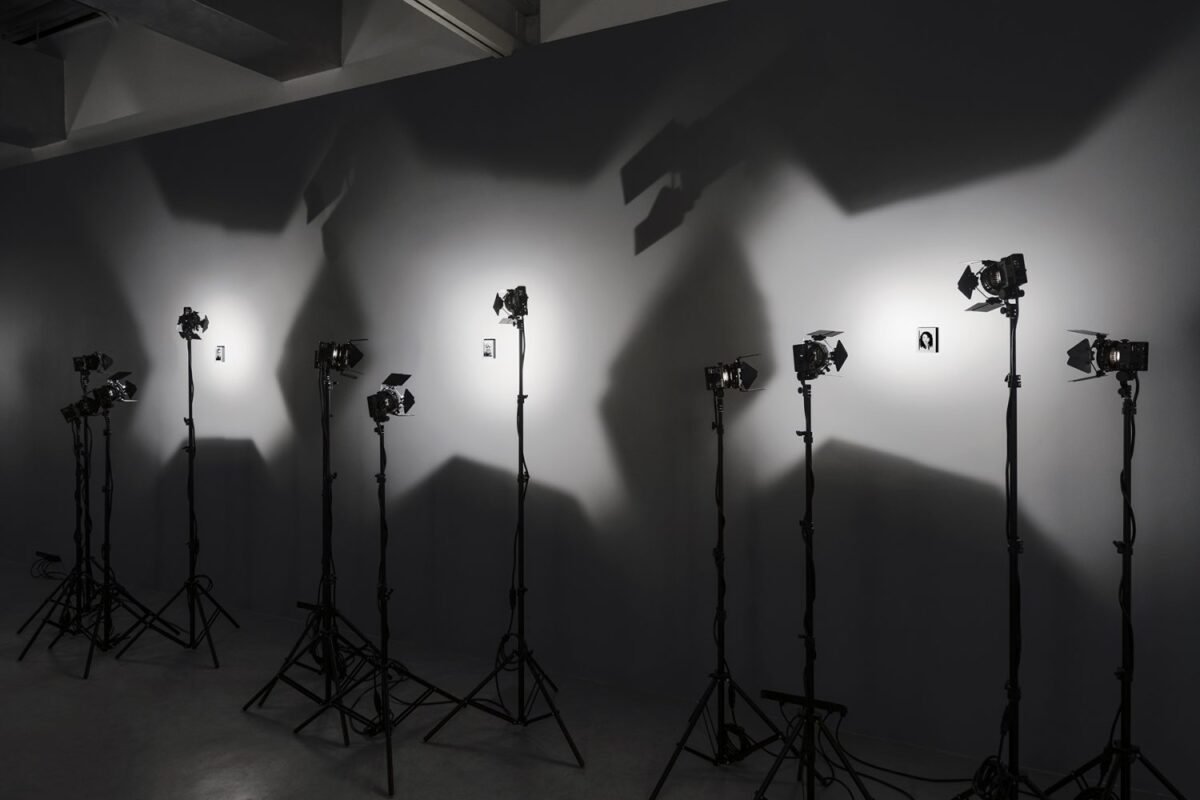Alfredo Jaar
Five Women
Zürich
10.12.2022–23.3.2023
We are very pleased and honored to present the installation «Five Women» a project by Chilean artist Alfredo Jaar at tichyocean, Switzerland.
With the portraits of these «Five Women» Alfredo Jaar continues to pursue his intention of institutionally presenting 100 significant women who still generally receive less attention than their male counterparts. So, we are honored to be able to continue this project with five women and, after the mostly anonymous Women from Kyjov by Miroslav Tichý, to now show these five fighters and make a small contribution to making them better known.
Alfredo Jaar’s «Five Women» literally shines a spotlight on five extraordinary women. The five small-format photographic portraits are each illuminated by five spotlights in the darkened exhibition space. The 25 spotlights on their tripods fill the space and indicate the path of the visitors, who themselves become actors in a shadow play. The light and the overlapping shadows create a carefully composed, theatrical staging of the five portraits of women. They determine the visitors’ encounter with the women.
The «Five Women» are the Czechoslovak politician, resistance fighter, and women’s rights activist Milada Horáková; the Czech journalist, writer, and translator Milena Jesenská; the Czech sociologist, politician, and activist Alice Garrigue Masaryk (also Masaryková); the Polish anthropologist and Roma activist Anna Mirga- Kruszelnicka; and Czech women’s rights activist Johanna Nejedlová. While Horáková, Jesenská and Masaryk were three of the most significant women in Czech history, Mirga and Nejedlová are two young women who are actively involved in women’s rights and marginalized groups today.
Dr. Anna Mirga-Kruszelnicka was an activist for Roma rights, co-founder and member of several Roma youth organizations and is currently a member of ternYpe (International Roma Youth Network). She is a co-founder and member of the Alliance for the European Roma Institute (ERI) and Deputy Executive Director of the European Roma Institute for Arts and Culture (E-RIAC) in Berlin/Germany.
Johanna Nejedlová is co-founder of Konsent, which specializes in preventing sexual violence against women and creating safe environ- ments for women. In 2019, she received the Women in Youth Activism Award, beating climate activist Greta Thunberg.
Milada Horáková was sentenced to death and hanged in 1950 by the Stalinist regime in what was then Czechoslovakia. She was an early advocate of the Czech women’s movement and went into resistance both to Nazi socialism (1938- 1945) and to the communist dictatorship after it took power in 1948. As a member of parliament, she advocated political pluralism, which alone could protect freedom and individualism, but resigned her mandate in 1948 and went underground until she was arrested for «anti-Soviet conspiracy»,«high treason», «espionage», and «subversive behavior» and sentenced in a public show trial.
Milena Jesenská was a journalist who also fought against the Nazis and helped Jews, as well as Jewish and non-Jewish emigrants, to escape and hid functionaries of the Czechoslovak Communist Party from the Gestapo. In 1939, however, she herself was arrested by the Gestapo and sent to Ravensbrück concentration camp, where she died in 1944 because of a kidney surgery. However, Milena Jesenská became best known as «Kafka’s girlfriend», with whom she maintained a lively, romantic correspondence in 1920.
Alice Masaryková was born in Vienna and was the first of four children of the couple Tomáš Garrigue Masaryk and US-American Charlotte Garrigue. Her siblings were Herbert, Olga, Eleanor, and Jan Masaryk, who was foreign minister of Czechoslovakia from 1940 to 1948 and was assassinated by the communist secret service in 1948. Alice Garrigue Masaryk was imprisoned in Vienna in 1915 because of her father’s Czech national aspirations against the Habsburg regime. Even after her imprisonment, from which she was released thanks to a petition organized by her father with 40,000 signatures of US American personalities, she was not allowed to teach sociology, so she offered classes from home. After World War I, her father Tomáš Garrigue Masaryk helped found Czechoslovakia and became its first president (1918 – 1935). Alice Masaryková herself became one of the first women in parliament and president of the Red Cross. After the death of her mother, she assumed her representative role and was fondly called «First Lady». With the Nazi invasion in 1938, she fled to Chicago, where she died in 1966.

